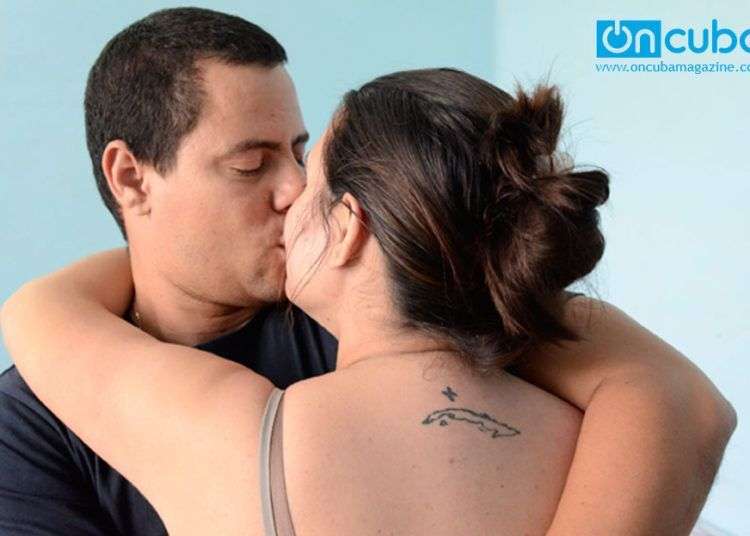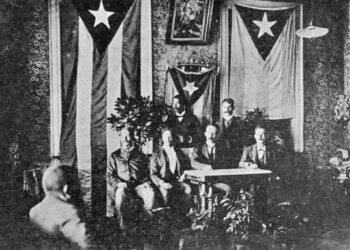At the time of this interview, and for a long time, I’m sure Israel Rojas is a happy man. Buena Fe´s leader has just concluded the best of his works. His daughter Ana Paula has just come to life.
In the midst of congratulations and work as a first-time father, the famous artist talked to OnCuba about ¨Dial¨, his new album and the presentation of this material at a concert in the U.S. city of Miami; so, let us listen to him:
“The album has thirteen tracks, twelve of which are mine, and the other one was made by Andrés Suárez and myself. He is a Spanish singer who was playing here with us. Several songs were born from that relationship, including this one. There is a pretext, to pay tribute to the 90th anniversary of the Cuban radio, that’s why we used that name for the CD. Although we could not present it last year, by a thousand issues, I thought our original pretext did not lose validity, so we didn’t make substantial changes. Finally, we used several iconic elements and some sort of Buena Fe´s dial was established.
The arrangements are mostly by Ernesto Cisneros, our pianist, who was responsible for seven songs. There are also arrangements by Yibrán Rivero and Vicente Alejandro Trigo, the members of the D’Corason Duo, who make a work that I really appreciate; mainly because they are superb instrumentalists. There is another arrangement by Joel with Aldito Lopez Gavilan. And as usual, a little more collective arrangements with the band, mainly by Cisneros and myself, anyway …”
From the recent tour of Miami, Israel tells us about the previous trips of the band there.
“This is the third time we’re going to Miami. We were there before with La Charanga Habanera and Vocal Xampling, and then we went there again. There were, especially at that second time, many media manipulations. They tried to show the public a mistaken opinion of our work and intentions. There were people who had the outlandish idea that we were a group with ulterior motives and others who thought we were going to betray the Revolution. And I’d rather be hated for who I am, to be loved for what I am not. So we decided not to go there anymore.
“Let us say, one concert a year means nothing to us, even economically. That’s why we do not need to go to Miami. It does reports on the spiritual, emotional, in the love received from the people there who like our work and oppose intolerance, or those who go to our concerts just to enjoy the music, with absolute respect. That’s very good, it is intoxicating, is a force that moves you.
“The huge amount of people who came to Cuba from the United States and asked us to return there convinced me to do it; and also those who wrote in the social networks and asked us to play there again. So it gives us a great pleasure to sing for a group of Cubans, or anybody, who wants to enjoy our work.”
Finally, and luckily for our fans, we returned to U.S. In addition, this concert had the added value of presenting not only a new album, but the material of earlier works, whose lyrics and chords had not been heard live in Miami. On his impressions of this concert, Israel says:
“The public Cuban artists find in Miami is not an American audience. It is the same Cuban public. Now we play for about two thousand five hundred people and almost all were Cubans. Cubans, also called by Facebook, so that almost everyone was young. The concert was very beautiful, very nice things happened there, we were praised a lot, and even some people read things to us in the very scenario… There were many people who wrote very beautiful things in networks. We made an imperative promotion in the media, but the digital networks were essential in that aspect . I must say that the media were generally very friendly, and we also published everything we said on camera, unedited, on our Facebook page.
“Look, some people think that I am dedicated to this business for money, and they are totally wrong . Because what I feel when I go to Miami, is the same I feel when going to Manzanillo, or Moa. That wonders of feeling myself useful to someone through my song. Trying a song can be a balm, a food to cure the pain of someone; that is my intention. ¨Do your job well and the opportunities will come alone, ¨ my grandfather told me. So we are going to Miami with the expectation of seeing an audience that identifies itself with our work, who want to enjoy our work and are happy to see us. And I’ll try to do my best for them.
Could it be the song, culture, the ones that strengthen the bonds that unite and not those that separate? Could the art beat manipulations and other demons of intolerance? In this regard, Buena Fe’s director says:
When you remove that entire rare mystical, at the end is the song. The same song, no matter how you think, that has accompanied you for so long, perhaps even from your childhood. I do not share some artists´ views or personal and political criteria, however, these same artists have beautiful songs. And that’s what matters. Beyond what their criteria can mean, I go to the artist, to what he transmits through his work.
“There’s a whole generation that jumps over intolerance, which still exists in Miami through a group of people who are very virulent, almost to a fault. But there is also an audience that listens to us, with no other aspiration than enjoyment, an aspiration of assuming that I like this music and I’m going to enjoy it, without complexes, or political obstacles. They are people who have discovered that Cuban culture is still in Cuba, not in Miami, and this is an audience that has chosen to remain being Cuban, wherever they live. People begin to revere their culture, to rediscover it. Hearing Cuban music, people follow and dance with Los Van Van when they are in the U.S. People support the Cuban national baseball team without thinking if it is the official team or the government’s team or whatever. Cuba is just my team and I support it. People applaud Silvio, even in Orlando. Because all that is Cuba as well. “










